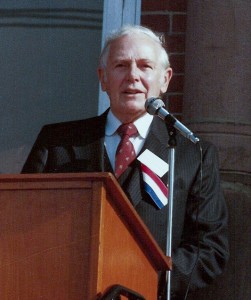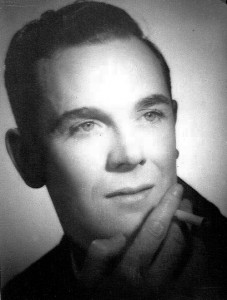True Tales from Canton’s Past: A Good Man
By George T. ComeauEd Bolster was a good man. The question always remains: how do you measure the life of a good man? Recently, while going through a box of papers, I came across five neatly typed pages with the heading “What I did for love.” Edward Bolster, one of Canton’s favorite lifelong residents, wrote the short essay shortly before his death in August 2000.
Bolster lived his entire life in one place: Canton. From this small town his reach was enormous. Bolster touched many lives in his 84 years here, and there is hardly a soul who remembers “Bo Bo” that cannot share a story about this kind and giving man. But it is in Bolster’s own words that we see how the man saw himself. In private and public moments he writes of kind deeds that all had a basis in love.
Bolster writes of a time when he was working for the New York & New Haven Railroad in 1950 when he, along with a group of fellow employees, were matched for a blood transfusion that would save the life of a woman who suffered from bleeding ulcers and was about to give birth by cesarean section.
“The room gradually thinned out and it dwindled down to three of us,” he wrote. “Finally they came in and said my blood was it. I wasn’t too happy and didn’t feel as brave as I had starting out. I was taken upstairs in an elevator and taken to the patient’s room. It was dark; I was told she couldn’t stand the light. Her face was covered with cold cream or grease. Her lips were all dried and cracked, and she looked like death. I was placed in a bed alongside hers and my blood went into a bottle and into her arm. I never saw the baby or heard about it after.”
Simple acts of unselfishness are the hallmarks of the more than 60 entries that Bolster records through his life. Commonplace deeds are chronicled — he helped paint Nellie Carroccio’s cottage, papered sister Evelyn’s bedroom, Helen Martis’ kitchen, sang the Lord’s Prayer at niece Carol Geissler’s wedding, was an usher … helped a nephew … and so on.
Some of the good deeds include small loans without interest. “I loaned Harry Abramowitz $400 so he could complete the repairs he was making on his house at 16 Lewis Street.” After the construction was completed, Abramowitz confided in Bolster “he was sure he had cancer.” Bolster never mentioned the loan to his dying friend; after Abramowitz’s death a local attorney sent a $400 check to Bolster.
There are plenty of civic accomplishments tallied: Santa Claus for the American Legion, the Town Club and the Trinity Church. Bolster was appointed to the Canton Historical Society and served many years. He was instrumental in the success of the Historical Society and writes, “Katherine Sullivan, the president, insisted that I join as a member in 1961.” Bolster had been going to the society since 1957 and his passion was local history. After Sullivan died in 1976, it was Bolster who would take the reins and place the society on the map. Bolster credits people and industries that supported his work. “With the wonderful assistance of Draper Bros., Mildred Morse Allen, Thomas Hays, Edith Peterson, Gene Williams and many others,” Bolster acknowledged that he was “able to keep the building from falling apart.”
Amazingly, Bolster believed it was the Historical Society that people were supporting, when in fact, as anyone can attest to, it was Bolster whom people were giving to. Hardly anyone could deny a request from this kind man. The Garden Club planted flowers; the town plowed the snow. “I never had to cry; all I had to do was look sad and help was on its way.”
Looking sad was easy for Bolster, for at the heart of this man was a great actor. Bolster always described himself as a “Stage Door Johnny,” referring to his love of the theatre. The passion for the stage started in 1946, and he found a way to meet many celebrities of his day. Mae West, Tallulah Bankhead, Lawrence Olivier, Gloria Swanson and Laurel & Hardy — all were on his list of glitterati that he had met. Bolster recalls walking down Third Avenue in New York City with his theater friends and seeing Greta Garbo: “She had long grey hair and a sweatshirt, but there was no mistaking her face. We kept on walking.”
Bolster’s middle age was spent acting in several Boston theaters. From 1950 through 1961, Bolster belonged to the Peabody Playhouse, the YMCU Players, the MIT Community Theater, the Tufts Community Theater, and closer to home, the Canton Informal Players and the Sharon Community Theater. Bolster joined the Actors Equity Union in 1960 and worked with many stage actors in summer stock and community theaters.
It was the people of Canton who most benefited from Bolster’s kindness: “In December ’86 I monitored Edith Peterson who was beginning to slip. I had to have her license revoked as she had had two minor accidents. I found that she was sending money to every cause in the book so I stopped that. I was made power of attorney and monitored her spending and bills. I had her placed in a rest home (Randolph Crossings) where she died, and I arranged her funeral.” Such is the work of a good man.
The good man’s work continued for other friends as well: “I monitored Gene Williams who was not eating and took him shopping and checked his mail. Gene was getting very forgetful.” When the family attorney was unable to reach Williams, Bolster knew where the key was hidden and went to the large estate house on Pleasant Street (now the Williams Estate). “I found Gene on the floor and his bed was soaked in blood. He told me he had fallen down the stairs. There were cuts on his head.” Williams died four days later, and again Bolster assisted with the funeral.
And his love for his father, whom he affectionately called “Pappy,” is endearing. “Took care of Pappy after he had a slight shock and got him to walk again by exercising him every night, and making him walk thru the rooms. I would get in back of him and put my arms around him and push his legs, like vaudeville cake walk.” Bolster did this every night for ten years.
When Bolster was diagnosed with cancer, the entire community was saddened. As the end approached, Bolster tidied up his affairs and made plans for his own death. As in all other times, this was a man who comforted others, even in his own decline. As he wrapped up his life, he planned his own funeral and made sure the proper songs would be sung and the right blue suit was laid out and even planned the menu for the reception after his burial. Bolster died without leaving any immediate family. After his will was probated, Bolster’s modest estate was divided three ways: to his church, to the Historical Society, and to the public library.
At the end of his five-page essay that surveys his life he writes, “Now it is time to step down and let the vibrant young healthy men take over. And I have been very lucky so far.” It was we who were lucky, lucky to have known a good man.
Short URL: https://www.thecantoncitizen.com/?p=8948












